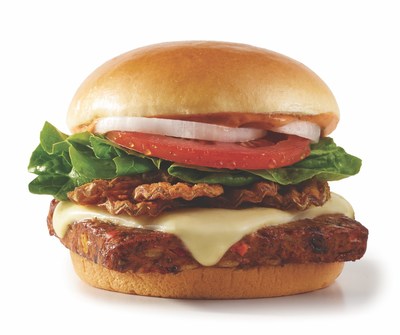
Over the past year, my husband and I have begun implementing more plant-based meat and dairy alternatives into our diets. Treats like Beyond Meat tacos and iced coffee with oat milk have quickly found their way into our family’s fridge, bellies and hearts.
We are far from the only ones. The plant-based food market is estimated to reach more than $74 billion (yes, that’s billion with a B) by 2027, with $17.5 billion coming just from meat substitutes. It’s no wonder gourmet restaurants and fast-food chains alike are looking to expand their meatless menus.
Wendy’s is the latest fast food chain to offer a plant-based sandwich option. Last week, the Dublin, Ohio-based company began testing its new Spicy Black Bean Burger in three U.S. markets: Columbus, Pittsburgh and Jacksonville.
As of press time, Wendy’s had not set an end date for the test run, but John Li, the company’s vice president of culinary innovation, told QSR Magazine that he and his team hope to have a better sense of the black bean burger’s future by “early August.”
Unlike McDonald’s McPlant, Taco Bell’s Naked Chalupa, or Burger King’s Impossible Whopper, Wendy’s black bean burger — which also contains chickpeas, carrots, corn, bell peppers and brown rice — isn’t trying to mimic meat.

Wendy’s new menu item is filling a much-needed gap in fast food’s meat-free offerings: sandwiches made of actual, recognizable vegetables!
After all, as Food & Wine restaurant editor Khushbu Shah wrote earlier this year, “tech meat” (i.e. Beyond Meat and Impossible) has a smaller carbon footprint than actual beef, but it's still five times greater than the carbon footprint of a bean-based burger patty. In addition, she pointed out, “many people are vegetarian or vegan because they don't want to eat anything that resembles meat.”
No one eats a bean burger expecting it to taste just like beef. That’s kind of the point — it is something entirely different, in terms of look, texture and taste.
As Eryn Bennett, Wendy’s manager of culinary production and innovation, said in an interview with QSR Magazine, the company chose black bean as the base ingredient because it’s familiar enough to encourage customers to try it. “It’s not a substitute for meat. This is something that can stand on its own.”
Wendy’s has attempted several plant-based offerings over the years.
In 2015, the chain introduced its first black bean burger to three test markets across the U.S. While this burger did not advance beyond the testing phase, it was used as the basis for the recipe development of the current Spicy Black Bean Burger.
In 2019, Wendy’s introduced — and then quickly removed — a pea protein sandwich called The Plantiful Burger on its Canadian menu. (Pea protein is not to be confused with peameal bacon, a Canadian pork specialty and literally the opposite of plant-based eating.)
And, of course, who could forget Wendy’s “SuperBar” salad bar of the 1980s and 1990s? It was vegetarian — if you don’t count the tacos, the meat-filled pasta sauce, etc.
This actually brings up an important point in fast food’s expansion into different types of protein: “Plant-based” doesn’t necessarily mean “meat free,” nor does it mean vegetarian or vegan. In fast-food kitchens, it can be difficult to have grill space and prep areas specifically designated for vegan items only, especially if there are only one or two menu items that fall into that category. (Just ask Burger King.)
Often, restaurants add mayonnaise and/or cheese to plant-based sandwiches for extra flavor. Wendy’s Spicy Black Bean Burger, for example, comes with pepper jack cheese on it. Bennett pointed out several times in the QSR Magazine interview that the new bean burger is meant for “flexitarian," and not “vegetarian” diets.
And here, dear TriplePundit readers, is where other writers would make a “Where’s the beef?” joke. I respect you too much to do that, however. You are welcome.
Image credits: Wendy’s corporate site; Michael Form/Pixabay

Megan is a writer and editor interested in sharing stories of positive change and resilience. She is the author of Show Up and Bring Coffee, a book highlighting how to support friends who are parents of disabled children. You can follow her at JoyfulBraveAwesome.com.














